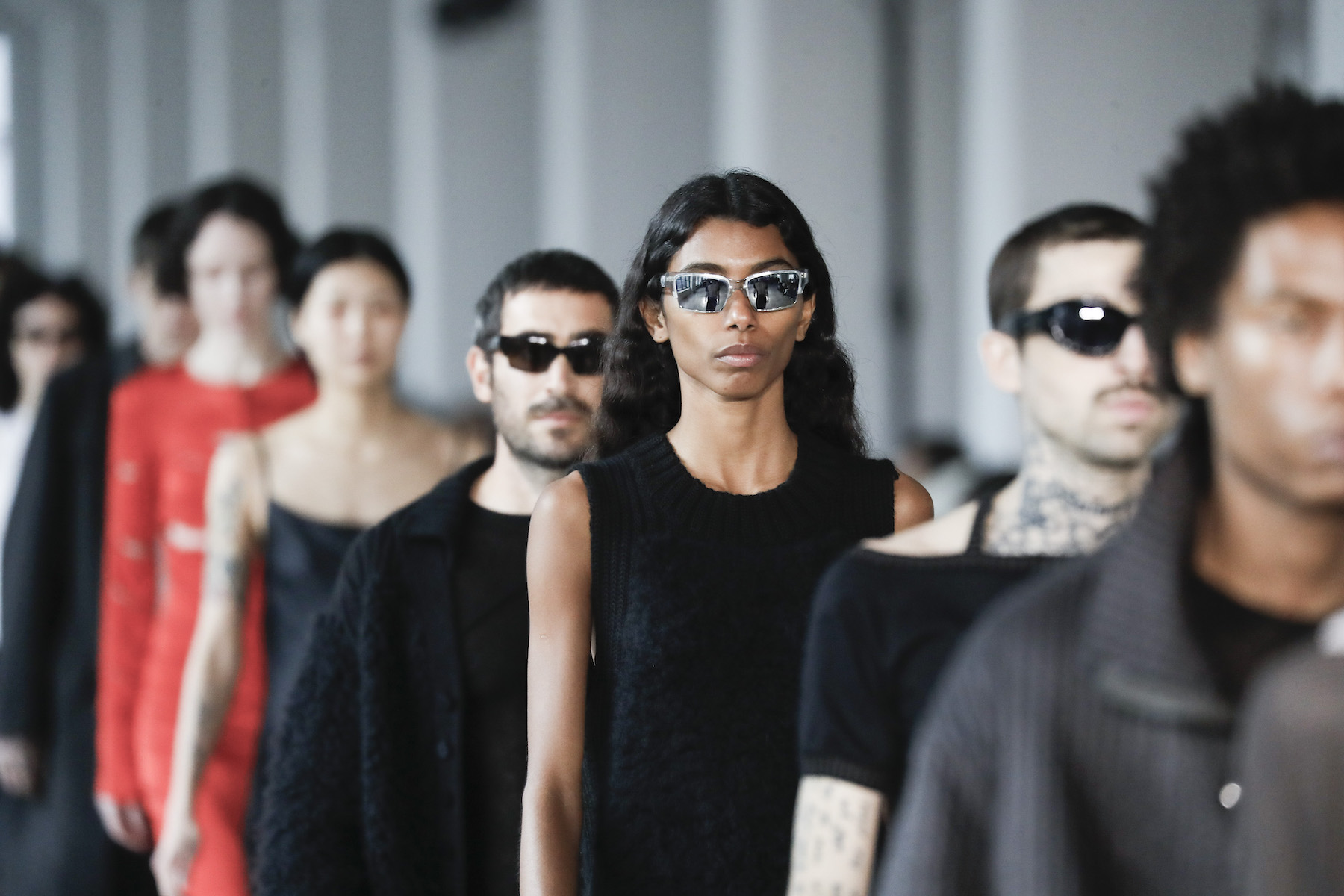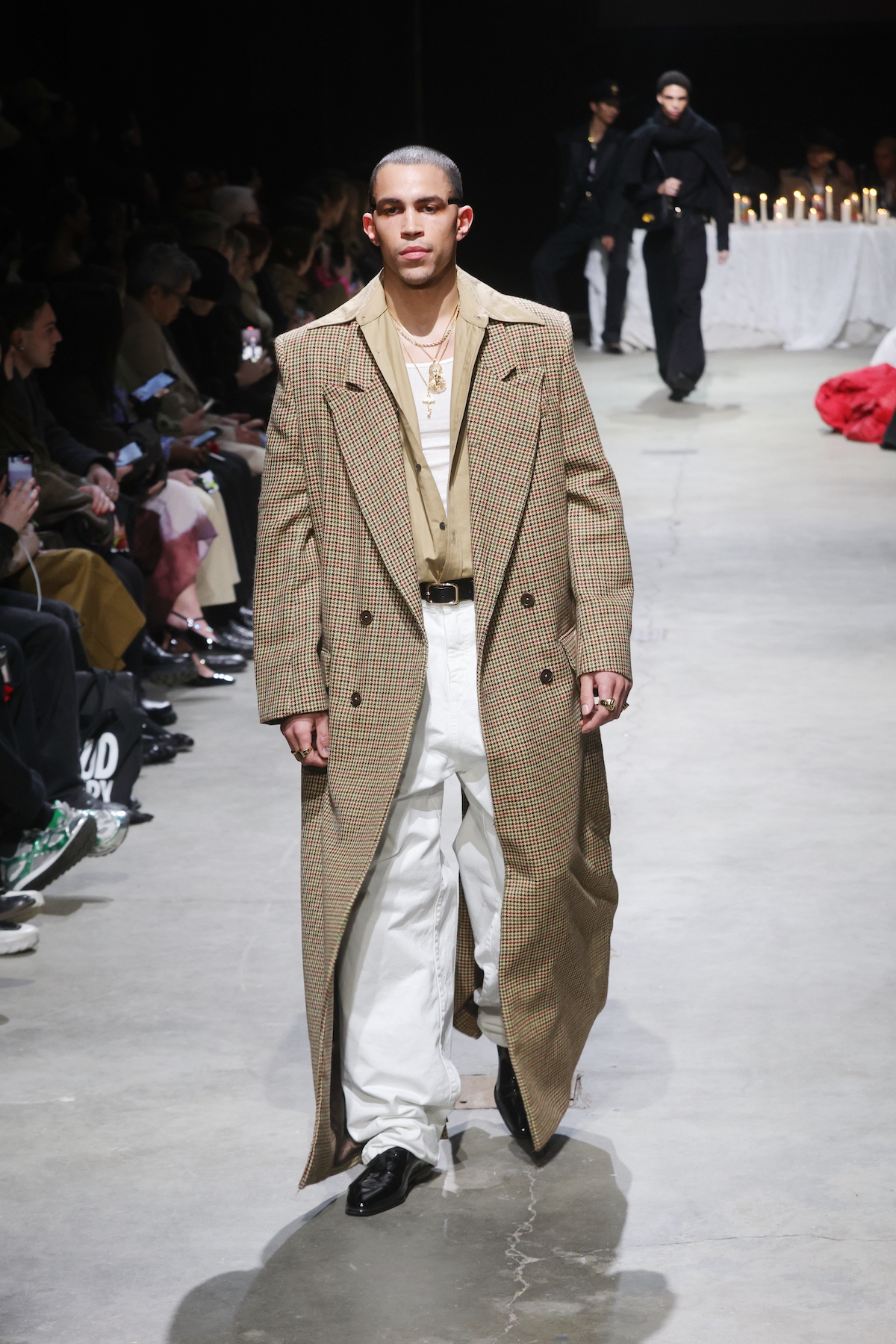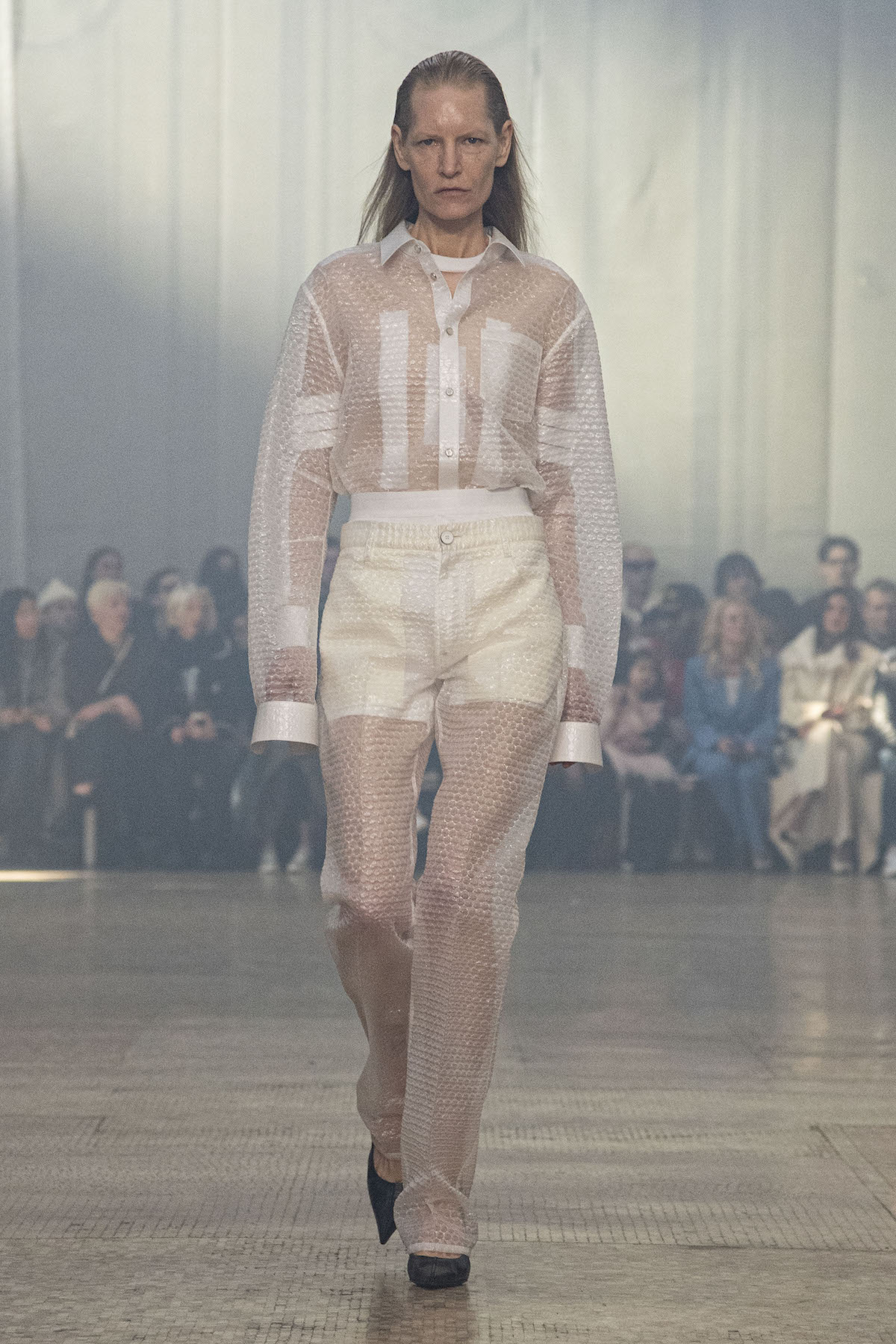
New York Fashion Week A/W 2024 heralds the start of fashion month, which sees subsequent stopovers in London, Milan and Paris in the coming weeks. It looks set to provide an energetic opening act: Peter Do’s sophomore collection for Helmut Lang began proceedings on Friday morning with a collection which mused on the dichotomy between armour and adornment, while Willy Chavarria– selected as part of the Wallpaper* USA 300 last year – rounded out the opening day with a collection that continued his evolution of one of the city’s most intriguing talents.
Here, Wallpaper* fashion features editor Jack Moss and contributing editor Tilly Macalister-Smith report live from the shows, selecting the best of New York Fashion Week A/W 2024 in our ongoing round-up.
The best of New York Fashion Week A/W 2024
Eckhaus Latta

In lieu of traditional collection notes, Mike Eckhaus and Zoe Latta have always offered a more abstract evocation of the season’s mood – here, they described the collection as ‘remembering America as though you’re standing on an orange milk crate hearing it crack under the weight of you thinking: “what will happen next?”’ Against the backdrop of floor-to-ceiling windows which looked out onto the New York City skyline, and a live soundtrack by Los Angeles-based musician Loren Kramar, including renditions of Lou Reed, Lana Del Rey and Frank Sinatra’s New York, New York, the collection itself seemed to muse on what American dressing, and being an American designer, means today (discussions this fashion week have centred on the particular challenges of showing on the New York schedule as a young designer, in part led by Carly Mark of Puppets + Puppets who has declared she will no longer show her collections in New York). In practice, like at Proenza Schouler, this meant a shift towards minimalism for the designers – or, at least, as stripped back as the brand’s undone aesthetic allows – honing in on the Eckhaus Latta codes with new clarity. Particularly strong were a series of surprisingly sharp shearling overcoats which opened the show (in a clash of textures, they were worn over featherweight sheer jersey tops), while shaggy ribbed knits will no doubt have real-world appeal. A mood of dishevelled glamour, meanwhile – a reflection, perhaps, of the show’s doomed America soundtrack – was struck in spaghetti-strapped silk slip dresses sliced away into streamers at the hem, or the iridescent fabric which was gently ruched and layered over mini dresses for the collection’s closing looks. JM
Proenza Schouler

It was a stripped-back outing for Jack McCollough and Lazaro Hernandez at Proenza Schouler this season, a mood in part decided the evening before the show (the designers noted backstage that a series of more embellished and embroidered garments had for the time being been shelved). The pair explained the shift towards reduction as part of an ongoing desire to eschew the search for ephemeral trends which defined their early collections towards a more rigorous consideration of exactly who the Proenza Schouler woman is – evolution, rather than revolution. So there was sharply cut tailoring and enveloping overcoats which recalled 1990s minimalism, diaphanous dresses which looped seductively around the body (in part recalling the silhouettes of the previous season), while a series of blanket-like knits – sliced away into frayed cut-outs – provided the show’s closing looks. ‘It’s about beauty and enveloping layers, and comfort and soulfulness. It’s about protecting yourself in softness, beauty, luxury and sensuality,’ said Fernandez backstage of the collection. With it, the designers cemented themselves as one of New York Fashion Week’s most consistent talents, and arguably still the week’s biggest draw for travelling editors. ‘We want to be making clothes that don't feel throwaway, that you're going to own for a long time,’ concluded McCollough. ‘We think that's how people dress these days.’ JM
Tommy Hilfiger

Could Tommy Hilfiger have chosen a more poignant location for his aptly named ’New York Moment’ show than Grand Central Station’s Oyster Bar? Unlikely. Outside the show, in the station’s famed cavernous cream marble atrium, onlookers jostled to catch a glimpse of their favourite TikTok celebs as well as Sofia Richie Grainge, Damson Idris, Sonam Kapoor, Junho Lee and Jon Batiste, who gave a finale performance that had the whole room on its feet. Inside, a surprisingly intimate affair came to life at ‘The Tommy’, a secret saloon bar serving martinis and champagne, where editors gathered around cocktail tables and Questlove played a soundtrack inspired by New York’s five boroughs. Since its inception, Hilfiger has always closely connected his brand identity to youth culture, in particular music, and this evening was no different. A slouchy, youthful, insouciant energy pervaded. And in case there were any doubt remaining as to the brand’s legacy, the clothes were a lesson in ‘classic American cool’ – its raison d'être.
Essentials of the American wardrobe were revisited with new freshness and relevancy, such as a black and white rugby shirt with generously proportioned sleeves. Chinos were cut to be roomy, hands slunk into pockets. Shirting layered under long line cardigans and trench coats felt effortless and relatable. A pleated skirt that fell below the knee, worn with block-heeled boots, read as a fashion silhouette that would translate into the real world. The shearling motorcycle jacket and oversized tweedy puffa will no doubt be popping up on wishlists. The show itself also marked a shift away from the see-now, buy-now approach, in order to adhere to the fashion week schedule – a move deemed necessary to accommodate the elevation of its clothing production which, with various Italian-sourced fabrics and more complex production, appropriately require a little more time. TMS
Willy Chavarria

Willy Chavarria’s shows have a kind of inexplicable magic which has made him one of New York Fashion Week’s most intriguing talents (the American designer was selected as part of the Wallpaper* USA 300 last year). In part, it is because he has played the long game – his career comprised design roles at American mega brands like Ralph Lauren before starting his eponymous label – allowing him to forge Willy Chavarria the brand at a moment he was confident in his hand and design codes, which largely centre on the multiplicity of the New York street (where he now calls home) alongside his Mexican-American upbringing in Fresno, California. And, having shown for several seasons, it is paying off: the designer won the 2023 Menswear Designer of the Year at the CFDA awards and has become a red carpet fixture (Billie Eilish is a particular fan), while his collection will soon be stocked in Barney’s and Saks. It lent proceedings a buzzy, celebratory air, backdropped by rows of church candles and religious ephemera which have long been a reference point for the designer. Chavarria’s hallmarks continued to be honed – notably a voluminous silhouette, which at once recalls baggy streetwear and the abundance of traditional couture – though freshness was struck in new fabrications (like houndstooth wool used across leaner trousers and a highly desirable elongated overcoat) and mood of refinement, seeing sweaters slung elegantly around the neck or some brilliant tuxedo- style tailoring, dramatically pitched at the lapel. JM
Helmut Lang

‘Protection versus projection,’ said Peter Do of his sophomore collection for Helmut Lang, which opened New York Fashion Week on Friday afternoon. ‘The way we protect ourselves is the way we define: armour or adornment?’ The designer continued this message via the printed collection notes, written in the same all-caps logotype Lang utilised in his own campaigns. So there were shirts and trousers which appeared crafted from bubble wrap – a suggestion of both protection and sensuality, exposing the inner workings of the garment, like pockets and zips beneath – while other knits rose up to engulf the face and body against the elements. A crescent-shaped bag, meanwhile, looked as though it was made for the model to rest her head on for comfort, like an aeroplane pillow, alongside technical vests which recalled the ‘bulletproof’ vests which appeared in Lang’s archival collections. As for the impetus behind the collection, Do said it emerged from a continuing observation of New York dress codes; the rigours of living in the city require both a need for protection and exhibition in the clothes people wear. ‘In a world of chaos, a system of dressing,’ the designer concluded of the collection, which though astutely mined hallmarks of the Helmut Lang archive, felt sometimes missing the unique frisson of sensuality and subversion which defined the brand’s seminal 1990s collections – a balance better struck by Do in his collections for his eponymous brand, which he will show later this month, on February 27, in Paris. JM
Stay tuned for more from New York Fashion Week A/W 2024







